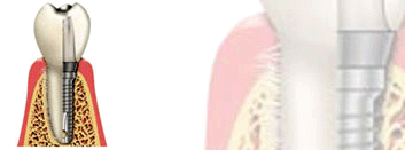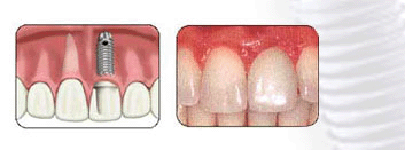| |
What Is An Implant?
An implant is a synthetic metallic root substitute that is placed (implanted) in the jawbone. It can be used to either replace a single missing tooth, provide an abutment (anchor or retainer) to replace several missing teeth, or beused as a retainer to provide added retention to a removable dental
appliance - such as a full denture. In fact, if you are missing all of
your natural teeth, it is possible to have maxillary (upper) and
mandibular (lower) fixed replacements - the replacements do not come
out and you cannot remove them yourself, even if you want to!A dental implant is a small titanium fixture that serves as the
replacement for the root portion of a missing
 |
natural tooth. The implant is placed in the bone of the upper or lower jaw and allowed to bond with the bone and serve as an anchor for the replacement tooth. Dental implants can be used to replace a single lost tooth or many missing teeth. Implant supported replacement teeth look, feel and function like natural teeth. Dental implants are a proven restorative option with a long clinical history. Dental implants preserve the integrity of the facial structure and reduce the inconvenience associated with tooth loss. |
Benefits
When teeth are lost, ongoing shrinkage of the jawbone occurs making the face look older. Dental implants can slow or stop this process. Dentalimplants look and feel like your own natural teeth.
Dental implants eliminate the pain and discomfort of removable full or partial dentures. Since dentures sit on top of the jawbone and gums, continuous shrinkage of the jaw bone alters the fit of the denture resulting in slipping or rocking of the dentures. Exposed nerves and irritation of the gum tissue may add to the discomfort. Implant supported replacement teeth are like natural teeth because they are anchored securely to your jawbone. Gum irritation and the pain of exposed nerves associated with conventional full or partial dentures are eliminated.
With ill fitting dentures, the teeth slip and slide around the mouth. The facial muscles become tense in an attempt to hold the teeth in place. This often results in mumbling, slurred speech or clicking noises. Replacement teeth allow you to speak with confidence in a relaxed and natural tone.
Dental implants can restore chewing efficiency comparable to that of natural teeth. This allows you to eat your favorite foods with confidence and without pain, enjoy what everyone is eating and not think twice about it. A full upper denture covers the palate of the mouth and reduces the ability to taste foods. With dental implants, you can have the palate removed from your upper denture so you can taste and enjoy your food.
Dental implants can eliminate the numerous embarrassing inconveniences of removable partial and full dentures. You will eliminate the use of gooey denture adhesives that must
be re-applied throughout the day. You will no longer need to cover your mouth when you laugh or smile, for fear that your teeth will pop out or fall down.
Protect Your Remaining Natural Teeth
Dental implants are often more appropriate than a bridge for the replacement of one or more adjacent teeth. With conventional bridgework, the teeth surrounding missing teeth must be ground down.
Dental implants often eliminate the need to modify these teeth, resulting in a conservative, yet esthetic restoration.
How Long Does It Take?
Two separate events are needed in replacing a missing tooth with an implant. First, there is the surgical phase when the implant is placed, and second the prosthetic phase, where the replacement teeth are constructed and fixed into the proper position.
Implant placement procedure involves making a small incision in the gum area where the implant is to be placed, preparing a site in the underlying bone, inserting the implant into the prepared site, and closing the tissue over the implant with several sutures. This area is left undisturbed for several months - usually 4 - 6 months. More healing time may be required for more involved situations. This is not uncommon. Because the lower jaw is composed of bone that is more dense than the upper jaw, the healing time is usually less when an implant is placed in the mandible. This 4 - 6 month healing process is nothing that you can feel. It relates only to the slow integration of the implant with your jaw. This integration occurs slowly.
After the healing and integration of the implant the implant placement site is exposed - the gum is cleared away from the top of the implant. The dentist will then fasten (by cement or with internal threads) to the implant the appropriate post that will be attached to the crown, bridge, or whatever type of replacement is indicated. The implant is held in place by the bone, the post is fastened to the implant and provides means to attach the crown (or bridge or whatever is the final replacement needed) to the implant.
 |
Do the implants work?
They are very successful. Occasionally there is an implant failure but maxillary and mandibular implants are more than 93% successful. Lower implants have a somewhat higher success rate those upper implants. If an implant is not going to be successful, many times this can be determined during or after the surgical phase and before the replacement tooth or teeth are constructed. Implants can fail, but this is not common.
Implants can be used to replace single missing teeth - especially back teeth. It is a more conservative alternative to fixed bridgework (crowns that require drilling of the natural tooth structure). They can be used to replace multiple missing teeth. They can be used in
conjunction with remaining natural teeth to provide support for missing teeth. They can be used to obtain better retention for full dentures, or to eliminate removable full dentures entirely. You also have alternatives to implants if you wish to replace a missing tooth or teeth. Fixed bridges (crowns), resin bonded and retained bridges, removable partial dentures, full removable dentures or you can do nothing at all. The implant option may offer the most conservative ztreatment for a fixed replacement - that is, the least amount of drilling of natural tooth structure. There are usually several possibilities for replacing missing teeth that will be effective and can easily be discussed with your dentist at your next office visit.
Who Is A Candidate?
Anyone who is missing one or more of their teeth due to injury, disease or decay, may be a candidate for dental implants. If one or a few teeth are missing, dental implants in conjunction with a crown or bridge can replace those teeth without loosing more bone. If all or most of your teeth are missing, the dental implants may be placed to replace a loose fitting full or partial denture. Adequate bone in your jaw is needed to support the implant(s) along with healthy gum tissues that are free of periodontal disease. Occasionally, older patients express concern that their age may prevent them from enjoying the benefits that dental implants offer. However, health is more of a determining factor than age. If you're healthy enough to have a tooth extracted, you're probably healthy enough to receive dental implants. Certain chronic diseases may contraindicate implant treatment. Your dentist will determine if you are a candidate for dental implants after a careful evaluation of your dental and medical health advantages of Implants
? Implant restorations are the closest thing to your own teeth.
? Implants have one of the highest success rates of any dental restoration. The placement of implants preserve your jaw bone. ? Proper placement and restoration of your bite will probably increase your chewing efficiency over conventional tooth replacement. ? Implants last and do not decay. Almost 500,000 implants were placed in 2000. The dental profession has over 30 years experience withimplants.
Disadvantages of Implants
◆ If you are in a hurry, implants are probably not for you.
◆ Bone grafts are sometimes needed.
◆Time has to be allowed for healing.
◆ Implant therapy may cost more than conventional tooth replacement.
|